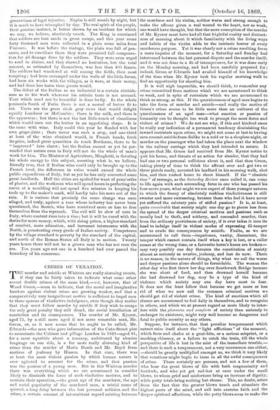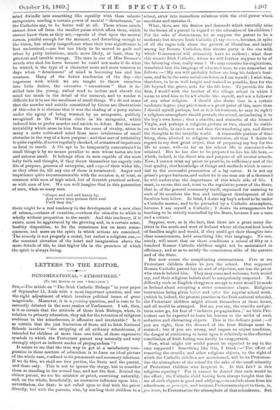CRIMES OF VEXATION.
THE murder and suicide at Whitton are really alarming events, if they can be fairly taken to indicate what some other recent double crimes of the same kind,—not, however, that of Wood Green,—seem to indicate, that the moral and imaginative barriers against violent crime are growing weaker, and that a comparatively very insignificant motive is sufficient to impel men to these spasms of vindictive indulgence, even though they realize that they must follow murder by suicide if they wish to escape the only great penalty they still dread, the social humiliation of conviction and its consequences. The murder of Mr. Kyezor, aged 75, by a still more aged if not more venerable man, Mr. Green, or, as it now seems that he ought to be called, Mr. Edwards—the man who gave information of the Cato-Street plot to assassinate the Cabinet and pillage London in 1820—aged 81, for a mere squabble about a tenancy, embittered by abusive language on one side, is a far more really alarming kind of crime than the murder of Maria Death and Mr. Boyd from motives of jealousy by Hinson. In that case, there was at least the most violent passion by which human nature is ever agitated to account for the crime, and that passion was the passion of a young man. But in this Whitton murder there was everything which we are accustomed to consider likely to diminish the force of such vindictive motives, and to restrain their operation,—the great age of the murderer, the age and social popularity of the murdered man, a trivial cause of quarrel, a long delay between the last personal collision and the crime, a certain amount of intermittent regard existing between
the murderer and his victim, neither warm and strong enough to make the affront given a real wound to the heart, nor so weak, one would have thought, but that the mere conception of the murder of Mr. Kyezor must have had all that frightful reality and distinct- ness of meaning about it which familiarity with the living ways and habits of the victim adds to the intrinsic horror of every murderous purpose. Yet it was clearly not a crime resulting from a mere impulse of the moment, for a Saturday and Sunday had intervened between the last personal dispute and the murder itself; and it was not done in a fit of intemperance, for it was done early on the Monday morning, and had been carefully prepared for ; indeed, Green or Edwards had availed himself of his knowledge of the time when Mr. Kyezor took his regular morning walk to find an opportunity for shooting him.
It is well nigh impossible, we should think, to remember any crime committed from motives which we are accustomed to think so weak, and in spite of restraints which we are accustomed to think so strong, as this. If the querulousness of aged men begins to take the form of murder and suicide—and really the motive of Green's crime seems to be little more than an outburst of the querulousness of an aged man—what emotion or passion of humanity can be thought too weak to prompt the most fierce and violent of crimes ? We do not see why, if this and kindred cases be really any indication of a permanent tendency diminishing the inward restraints upon crime, we might not come at last to having men commit suicide from dislike to a cold or to a sleepless night, or murder on the passenger who had taken the place next the window in the railway carriage which they had intended to secure. It appears that Mr. Green had received from Mr. Kyezor notice to quit his house, and threats of an action for slander, that they had had one or two personal collisions about it, and that then Green, taking plenty of time to think the affront over and get two or three pistols ready, accosted his landlord in his morning walk, shot him, and then rushed home to shoot himself. If the " obsolete vice " of revenge, as the Saturday Review once called it, can come to life again with such astounding force in one who has passed his four-score years, what might we not expect of those younger natures to which the frenzy of absolutely reckless vindictiveness is still sweeter and more entrancing, because those who feel it have never yet suffered the salutary pain of stifled passion? It is, at least, quite conceivable that society might one day go to pieces less from the spread of the deeper criminal motives and passions such as usually lead to theft, and robbery, and concealed murder, than from the ordinary peevishness of society, if it ever takes it into its head to indulge itself in violent modes of expressing ill-temper and to evade the consequences by suicide. Faults, as we are accustomed to call them—impatience, vanity, discontent, the temper which cannot contain itself when a key is lost, or a caller comes at the wrong time, or a favourite horse's knees are broken— may very possibly one day threaten the constitution of society almost as seriously as avarice, jealousy, and lust do now. There is no reason, in the nature of things, why what we call the worse and deeper passions alone should be formidable. The woman the other day who first threw her dog over Southwark Bridge because she was short of food, and then drowned herself because she had drowned her dog, may be a type of the kind of violence which society may one day have most to fear. It does not the least follow that because we get more or less rid of what we now call the common criminal motives we should get rid of violent crime. The kind of emotions which all classes are accustomed to feel daily in themselves, and to recognize in others, and which we at present regard as more likely to inter- fere with the pleasures and comforts of society than seriously to endanger its existence, might very well become as dangerous and fatal to public security as any others.
Suppose, for instance, that that peculiar temperament which cannot raise itself above the " light afflictions " of the moment, which frets and chafes at a gnat-bite, or a serious misprint, or a smoking chimney, or a failure to catch the train, till the whole perspective of life is lost in the mist of the immediate trouble,— and there is such a temperament, not a very uncommon one either, —should be greatly multiplied amongst us, we think it very likely that vexations might begin to issue in all the awful consequences of crime. There certainly are persons, and not a few of them, who bear the great blows of life with both magnanimity and fortitude, and who yet get red-hot at once under the small blows, to whom grief and misfortune bring an increase of dignity, while petty trials bring nothing but shame. This, no doubt, arises from the fact that the greater blows touch and stimulate the highest parts of the mind, and call into exercise faith and the deeper spiritual affections, while the petty blows seem to make the mind dwindle into something like equality with these minute antagonists, needing a certain power of mental " detachment," as the Catholics say, to be borne well at all. Those whose minds cannot draw off from the smaller pains which affect them, which cannot know them as they are,—specks of dust upon the mental cornea, painful enough for the moment, and disturbing enough to the vision, but utterly insignificant when their true significance is best understood,—are but too likely to be moved to guilt and crime by petty irritations, much more likely, at least, than by grievous and terrible wrongs. The man in one of Miss Bremer's novels who shot his horse because he could not make it do what he wished, is the type of a character more and more common in days when " detachment" of mind is becoming less and less common. Many of the better tendencies of the day—the eagerness with which we are taught to throw ourselves into little duties, the excessive " earnestness " that is in- stilled into the young, rather tend to inclose and absorb the mind too much in the detail of the moment, and to render it difficult for it to see the smallness of small things. We do not mean that the murder and suicide committed by Green are illustrations of this—for it is obvious that it was the chafing of a petty nature under the agony of being worsted by an antagonist, publicly recognized in the Whitton circle as his antagonist, which induced him to prefer murder and suicide to defeat. But the same irritability which arose in him from the sense of rivalry, arises in many a more cultivated mind from mere intolerance of small obstacles in the way of a keen purpose ; and that sort of irritability is quite capable, if never regularly checked, of ecstasies of impatience as fatal in result. A life apt to be temporarily concentrated in small things is by no means peculiar to men whose tastes are low and natures small. It belongs often to men capable of the most lofty faith and thought, if they throw themselves too eagerly into fits of purpose, grooves of enterprise, and =spend their wider life, as they often do, till any one of these is terminated. Anger and impatience quite incommensurable with the occasion is, at least, as common with men of high mind, but of feverish practical ardour, as with men of low. We can well imagine that in this generation of ours, when so many men "Glance and nod and hurry by, And never once possess their soul Until they die,"
there might be a real tendency to the development of a new class of crimes,—crimes of vexation,—crimes the stimulus to which is wholly without proportion to the result. And this tendency, if it exists, must be aggravated by the growing and, in a certain sense, healthy disposition, to fix the conscience less on mere conse- quences, and more on the spirit in which actions are conceived. The remedy is not properly a moral, but rather a religious one,— the constant elevation of the heart and imagination above the mere details of life, to that higher life in the presence of which the spirit is always living.































 Previous page
Previous page